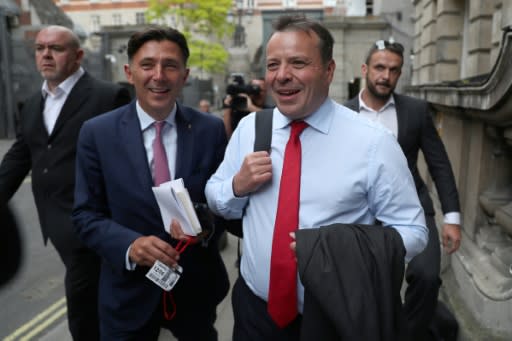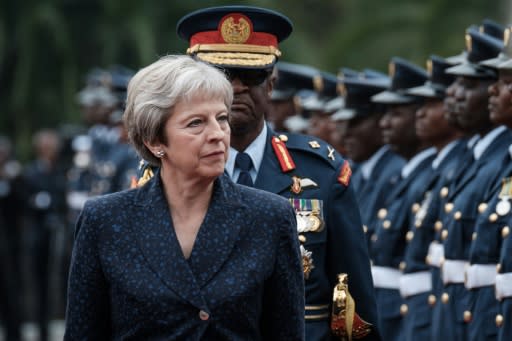Surge in Tory members sparks fears of right-wing takeover
As internal divisions over Brexit plague Britain's ruling Conservative Party, a recent surge in membership has left some fearing the new recruits have ulterior motives. The Tories have seen thousands of new members apply to join its ranks this summer, according to lawmakers and reports. But this newfound popularity has not been welcomed by all within the centre-right bastion of British politics. "There clearly is a movement of people joining the Conservative Party but for exactly what purpose it's impossible to say," Dominic Grieve, a pro-European MP, told AFP. In his constituency in southeast England it has grown by around 100 people to 1,200 members in recent months -- alongside his suspicions. "I'm sure there's a deselection agenda by some members of my association towards me," he added. "The Conservative Party's always been a broad church and tolerant of difference. But I'm afraid at the moment we're going through a political crisis which is reducing tolerance." MPs who back remaining in the European Union -- so-called Remainers -- suspect hardcore Brexit supporters from the right-wing UK Independence Party (UKIP) are joining the Tories to remake its leadership. Their concerns stem from businessman Arron Banks, the single largest bankroller in the 2016 EU referendum campaign, calling for the roughly 90,000 members of his Leave.EU group and its 1.4 million social media followers to join the Conservatives. He admits wanting to ensure the party's next leader -- and therefore prime minister -- is a hardliner if Theresa May is ousted amid fierce opposition to her plans for a post-Brexit "common rulebook" with the EU. Under Conservative rules new members are able to vote in leadership contests within three months of joining. "The best way to secure Brexit and our country's future is via the Conservative Party," Banks wrote in last week's Sunday Times, noting "it is in government and, for now, calls the shots. "A grassroots rebellion in the Tory party is possible. In the right conditions a new leader can be swept to power, and sanity can prevail. Our aim is to unite the right," he added. - 'Extremist infiltration' - Conservatives last month rejected Banks' own bid to join, reportedly judging he would likely bring them into disrepute. "He is not a Conservative and he supports a rival political party," pro-Remain MP Anna Soubry said in welcoming the move. She urged Tory Chairman Brandon Lewis "to show the courage and determination to stop the extremist infiltration". Brexiteer lawmakers disagreed and said they welcome the converts, noting Banks was a member as recently as 2013. Conservative Party headquarters declined to comment on Banks or provide new member numbers. A party source said: "We have been driving up membership steadily through a recruitment drive." Insiders added the spike was anticipated due to a new centralised membership system and nationwide campaign managers working to recruit. Lawmakers like Grieve and Soubry cannot see the national picture, they said. George Evans, 64, of Wirral in northwest England, is among the new members from UKIP but insisted he is a lifelong Tory voter and "far from being a subversive negative influence". He briefly left the party "to put pressure on them" to hold the 2016 referendum, and rejoined in August to influence Brexit "if there is a leadership challenge". Evans said the growing campaign for a second referendum spurred his decision as much as Banks. "My vision of Brexit is being lost to a Remainer PM (prime minister), Remainer cabinet and majority-Remainer Parliament," he told AFP. - 'Pure entryism' - Tim Bale, politics professor at Queen Mary University of London, said a spike in ardent Brexiteers joining the Conservatives was "almost inevitable". "If it is being coordinated in some way then that will help the process along," he added, noting its sign-up criteria is "pretty loose". Bale said the Tories are just the latest British political party targeted by energised activists in recent years, following membership surges for Labour and the SNP in Scotland. And its impact could be limited. He estimated Conservative membership may have risen up to 140,000, while UKIP peaked in 2015 with a mere 40,000 members. "It still couldn't constitute a UKIP takeover," Bale said of the recent crossovers. But Grieve believes the party must "protect itself" from the Banks-led "pure entryism" -- infiltration of a party by rivals to subvert policy. "If you leave the centre ground you are most unlikely to win," he said. The former attorney general conceded the party is relatively powerless to prevent entryism, invoking a wartime British mantra for worried Tory centrists: "Keep calm and carry on." Tory worries stem from businessman and top Brexit campaign donor Arron Banks (seen right) calling on members of his Leave.EU group and its social media followers to join the Conservatives and vote for a future hardline leader Leave camp supporters in Conservative ranks are opposed to leader Theresa May's plans for a post-Brexit "common rulebook" with the EU, already wary of her as a supporter of Remain in 2016 Former British attorney general Dominic Grieve, a Tory MP, is concerned a wave of new members could upset the party's traditional "broad church" -- and force out pro-Europeans such as himself




